The Impact of Psychoactive Substances on Mental Health: A Report
VerifiedAdded on 2021/04/21
|7
|1956
|81
Report
AI Summary
This report analyzes the impact of psychoactive substances on mental health, focusing on an interview with an individual struggling with substance abuse. The report examines the interviewer's approach, including the establishment of rapport and assessment of the interviewee's readiness to change. It identifies the impact of substance abuse on the interviewee's health and lifestyle, as well as other stressors they may be experiencing. The report highlights the interviewer's engagement and the professional conclusion of the interview, including plans for clinical intervention. The analysis covers various aspects of substance abuse, including its effects on physical and mental well-being, family life, and the overall de-addiction process, referencing relevant literature to support the findings.
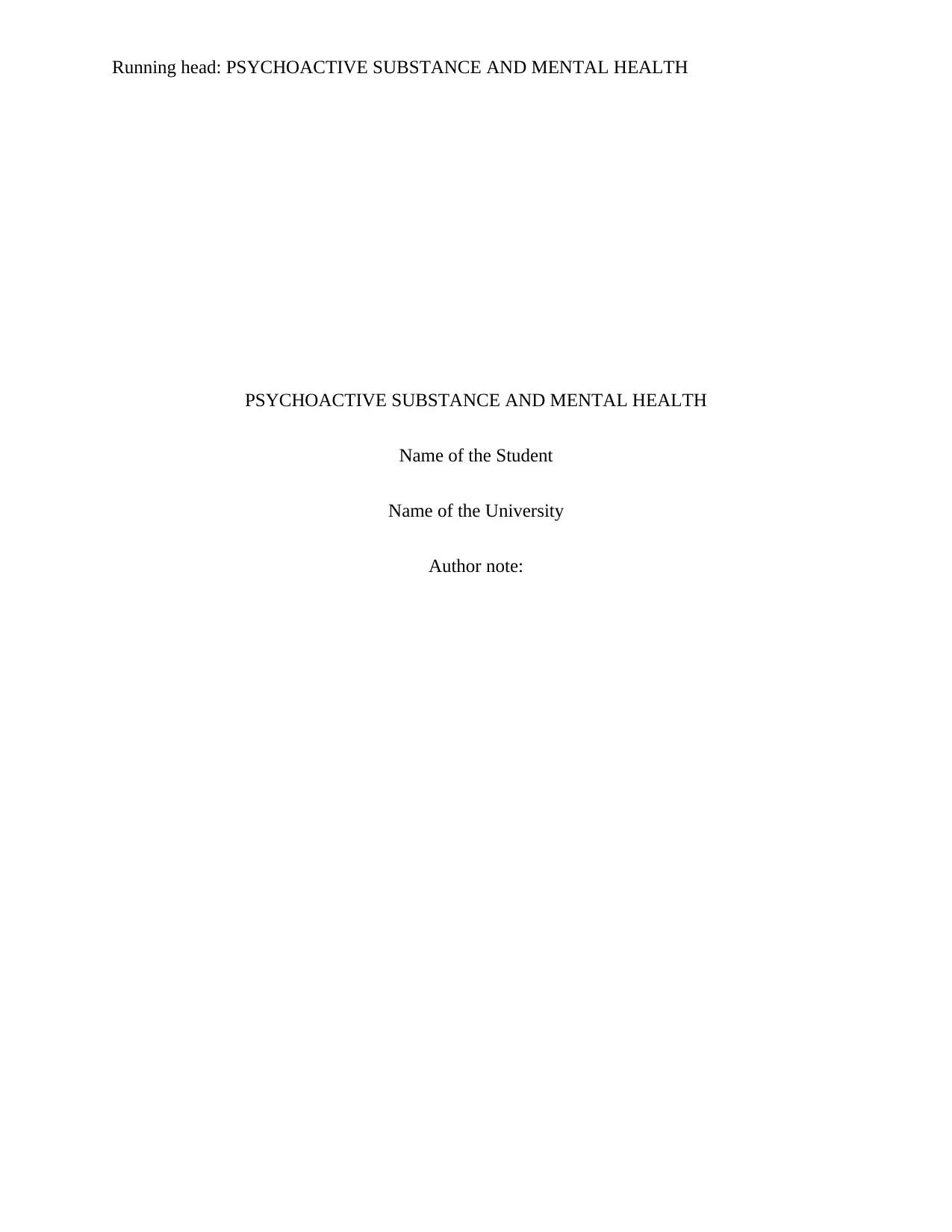
Running head: PSYCHOACTIVE SUBSTANCE AND MENTAL HEALTH
PSYCHOACTIVE SUBSTANCE AND MENTAL HEALTH
Name of the Student
Name of the University
Author note:
PSYCHOACTIVE SUBSTANCE AND MENTAL HEALTH
Name of the Student
Name of the University
Author note:
Paraphrase This Document
Need a fresh take? Get an instant paraphrase of this document with our AI Paraphraser
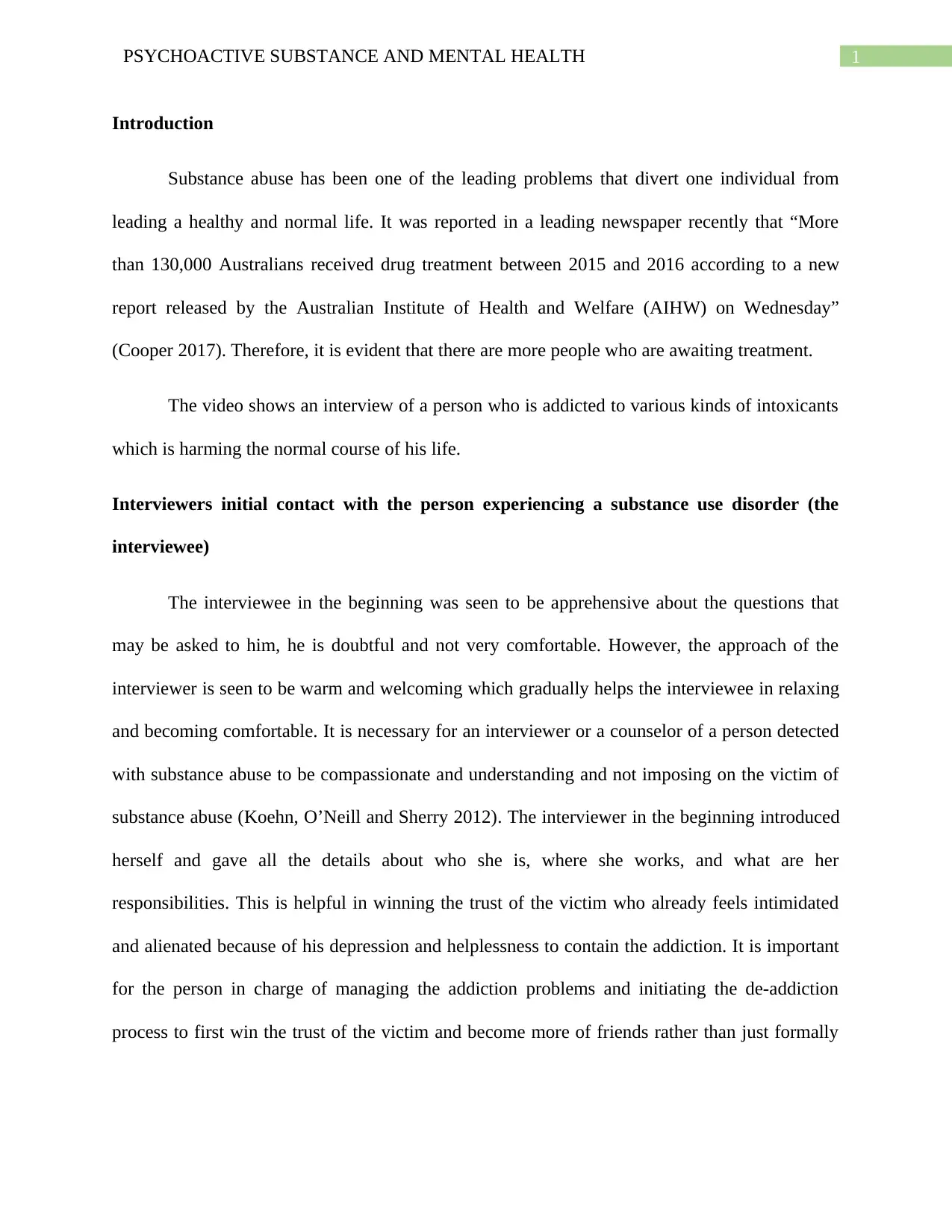
1PSYCHOACTIVE SUBSTANCE AND MENTAL HEALTH
Introduction
Substance abuse has been one of the leading problems that divert one individual from
leading a healthy and normal life. It was reported in a leading newspaper recently that “More
than 130,000 Australians received drug treatment between 2015 and 2016 according to a new
report released by the Australian Institute of Health and Welfare (AIHW) on Wednesday”
(Cooper 2017). Therefore, it is evident that there are more people who are awaiting treatment.
The video shows an interview of a person who is addicted to various kinds of intoxicants
which is harming the normal course of his life.
Interviewers initial contact with the person experiencing a substance use disorder (the
interviewee)
The interviewee in the beginning was seen to be apprehensive about the questions that
may be asked to him, he is doubtful and not very comfortable. However, the approach of the
interviewer is seen to be warm and welcoming which gradually helps the interviewee in relaxing
and becoming comfortable. It is necessary for an interviewer or a counselor of a person detected
with substance abuse to be compassionate and understanding and not imposing on the victim of
substance abuse (Koehn, O’Neill and Sherry 2012). The interviewer in the beginning introduced
herself and gave all the details about who she is, where she works, and what are her
responsibilities. This is helpful in winning the trust of the victim who already feels intimidated
and alienated because of his depression and helplessness to contain the addiction. It is important
for the person in charge of managing the addiction problems and initiating the de-addiction
process to first win the trust of the victim and become more of friends rather than just formally
Introduction
Substance abuse has been one of the leading problems that divert one individual from
leading a healthy and normal life. It was reported in a leading newspaper recently that “More
than 130,000 Australians received drug treatment between 2015 and 2016 according to a new
report released by the Australian Institute of Health and Welfare (AIHW) on Wednesday”
(Cooper 2017). Therefore, it is evident that there are more people who are awaiting treatment.
The video shows an interview of a person who is addicted to various kinds of intoxicants
which is harming the normal course of his life.
Interviewers initial contact with the person experiencing a substance use disorder (the
interviewee)
The interviewee in the beginning was seen to be apprehensive about the questions that
may be asked to him, he is doubtful and not very comfortable. However, the approach of the
interviewer is seen to be warm and welcoming which gradually helps the interviewee in relaxing
and becoming comfortable. It is necessary for an interviewer or a counselor of a person detected
with substance abuse to be compassionate and understanding and not imposing on the victim of
substance abuse (Koehn, O’Neill and Sherry 2012). The interviewer in the beginning introduced
herself and gave all the details about who she is, where she works, and what are her
responsibilities. This is helpful in winning the trust of the victim who already feels intimidated
and alienated because of his depression and helplessness to contain the addiction. It is important
for the person in charge of managing the addiction problems and initiating the de-addiction
process to first win the trust of the victim and become more of friends rather than just formally
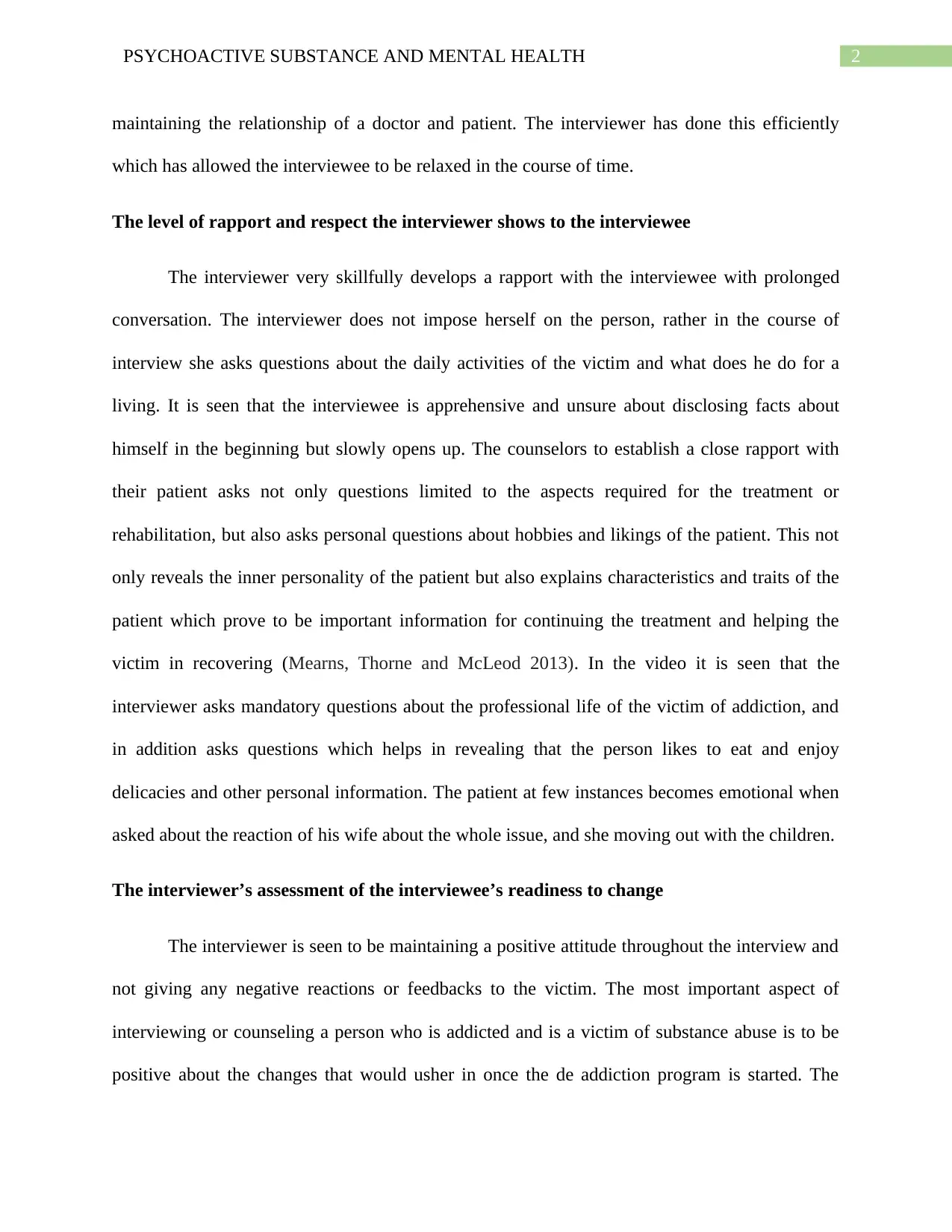
2PSYCHOACTIVE SUBSTANCE AND MENTAL HEALTH
maintaining the relationship of a doctor and patient. The interviewer has done this efficiently
which has allowed the interviewee to be relaxed in the course of time.
The level of rapport and respect the interviewer shows to the interviewee
The interviewer very skillfully develops a rapport with the interviewee with prolonged
conversation. The interviewer does not impose herself on the person, rather in the course of
interview she asks questions about the daily activities of the victim and what does he do for a
living. It is seen that the interviewee is apprehensive and unsure about disclosing facts about
himself in the beginning but slowly opens up. The counselors to establish a close rapport with
their patient asks not only questions limited to the aspects required for the treatment or
rehabilitation, but also asks personal questions about hobbies and likings of the patient. This not
only reveals the inner personality of the patient but also explains characteristics and traits of the
patient which prove to be important information for continuing the treatment and helping the
victim in recovering (Mearns, Thorne and McLeod 2013). In the video it is seen that the
interviewer asks mandatory questions about the professional life of the victim of addiction, and
in addition asks questions which helps in revealing that the person likes to eat and enjoy
delicacies and other personal information. The patient at few instances becomes emotional when
asked about the reaction of his wife about the whole issue, and she moving out with the children.
The interviewer’s assessment of the interviewee’s readiness to change
The interviewer is seen to be maintaining a positive attitude throughout the interview and
not giving any negative reactions or feedbacks to the victim. The most important aspect of
interviewing or counseling a person who is addicted and is a victim of substance abuse is to be
positive about the changes that would usher in once the de addiction program is started. The
maintaining the relationship of a doctor and patient. The interviewer has done this efficiently
which has allowed the interviewee to be relaxed in the course of time.
The level of rapport and respect the interviewer shows to the interviewee
The interviewer very skillfully develops a rapport with the interviewee with prolonged
conversation. The interviewer does not impose herself on the person, rather in the course of
interview she asks questions about the daily activities of the victim and what does he do for a
living. It is seen that the interviewee is apprehensive and unsure about disclosing facts about
himself in the beginning but slowly opens up. The counselors to establish a close rapport with
their patient asks not only questions limited to the aspects required for the treatment or
rehabilitation, but also asks personal questions about hobbies and likings of the patient. This not
only reveals the inner personality of the patient but also explains characteristics and traits of the
patient which prove to be important information for continuing the treatment and helping the
victim in recovering (Mearns, Thorne and McLeod 2013). In the video it is seen that the
interviewer asks mandatory questions about the professional life of the victim of addiction, and
in addition asks questions which helps in revealing that the person likes to eat and enjoy
delicacies and other personal information. The patient at few instances becomes emotional when
asked about the reaction of his wife about the whole issue, and she moving out with the children.
The interviewer’s assessment of the interviewee’s readiness to change
The interviewer is seen to be maintaining a positive attitude throughout the interview and
not giving any negative reactions or feedbacks to the victim. The most important aspect of
interviewing or counseling a person who is addicted and is a victim of substance abuse is to be
positive about the changes that would usher in once the de addiction program is started. The
⊘ This is a preview!⊘
Do you want full access?
Subscribe today to unlock all pages.

Trusted by 1+ million students worldwide
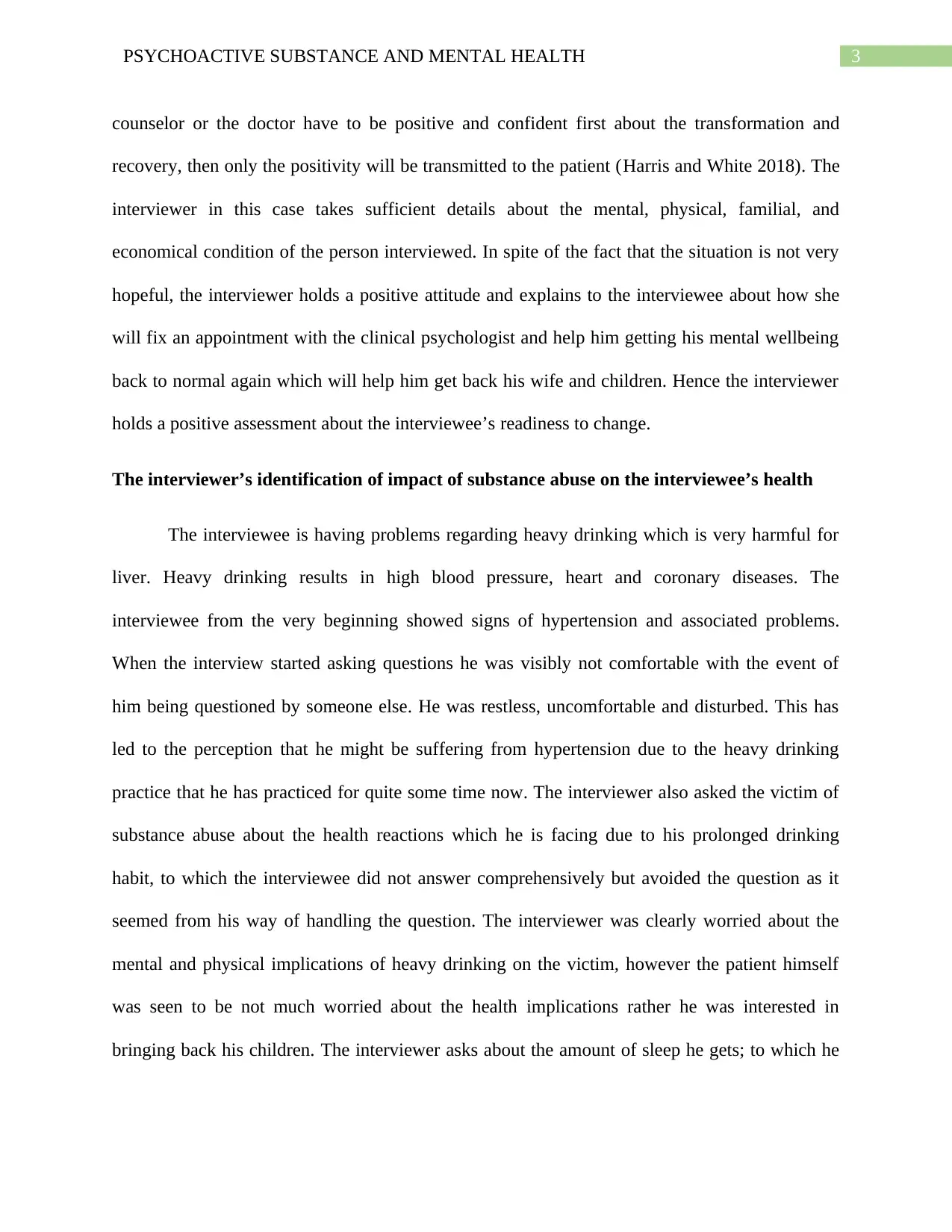
3PSYCHOACTIVE SUBSTANCE AND MENTAL HEALTH
counselor or the doctor have to be positive and confident first about the transformation and
recovery, then only the positivity will be transmitted to the patient (Harris and White 2018). The
interviewer in this case takes sufficient details about the mental, physical, familial, and
economical condition of the person interviewed. In spite of the fact that the situation is not very
hopeful, the interviewer holds a positive attitude and explains to the interviewee about how she
will fix an appointment with the clinical psychologist and help him getting his mental wellbeing
back to normal again which will help him get back his wife and children. Hence the interviewer
holds a positive assessment about the interviewee’s readiness to change.
The interviewer’s identification of impact of substance abuse on the interviewee’s health
The interviewee is having problems regarding heavy drinking which is very harmful for
liver. Heavy drinking results in high blood pressure, heart and coronary diseases. The
interviewee from the very beginning showed signs of hypertension and associated problems.
When the interview started asking questions he was visibly not comfortable with the event of
him being questioned by someone else. He was restless, uncomfortable and disturbed. This has
led to the perception that he might be suffering from hypertension due to the heavy drinking
practice that he has practiced for quite some time now. The interviewer also asked the victim of
substance abuse about the health reactions which he is facing due to his prolonged drinking
habit, to which the interviewee did not answer comprehensively but avoided the question as it
seemed from his way of handling the question. The interviewer was clearly worried about the
mental and physical implications of heavy drinking on the victim, however the patient himself
was seen to be not much worried about the health implications rather he was interested in
bringing back his children. The interviewer asks about the amount of sleep he gets; to which he
counselor or the doctor have to be positive and confident first about the transformation and
recovery, then only the positivity will be transmitted to the patient (Harris and White 2018). The
interviewer in this case takes sufficient details about the mental, physical, familial, and
economical condition of the person interviewed. In spite of the fact that the situation is not very
hopeful, the interviewer holds a positive attitude and explains to the interviewee about how she
will fix an appointment with the clinical psychologist and help him getting his mental wellbeing
back to normal again which will help him get back his wife and children. Hence the interviewer
holds a positive assessment about the interviewee’s readiness to change.
The interviewer’s identification of impact of substance abuse on the interviewee’s health
The interviewee is having problems regarding heavy drinking which is very harmful for
liver. Heavy drinking results in high blood pressure, heart and coronary diseases. The
interviewee from the very beginning showed signs of hypertension and associated problems.
When the interview started asking questions he was visibly not comfortable with the event of
him being questioned by someone else. He was restless, uncomfortable and disturbed. This has
led to the perception that he might be suffering from hypertension due to the heavy drinking
practice that he has practiced for quite some time now. The interviewer also asked the victim of
substance abuse about the health reactions which he is facing due to his prolonged drinking
habit, to which the interviewee did not answer comprehensively but avoided the question as it
seemed from his way of handling the question. The interviewer was clearly worried about the
mental and physical implications of heavy drinking on the victim, however the patient himself
was seen to be not much worried about the health implications rather he was interested in
bringing back his children. The interviewer asks about the amount of sleep he gets; to which he
Paraphrase This Document
Need a fresh take? Get an instant paraphrase of this document with our AI Paraphraser
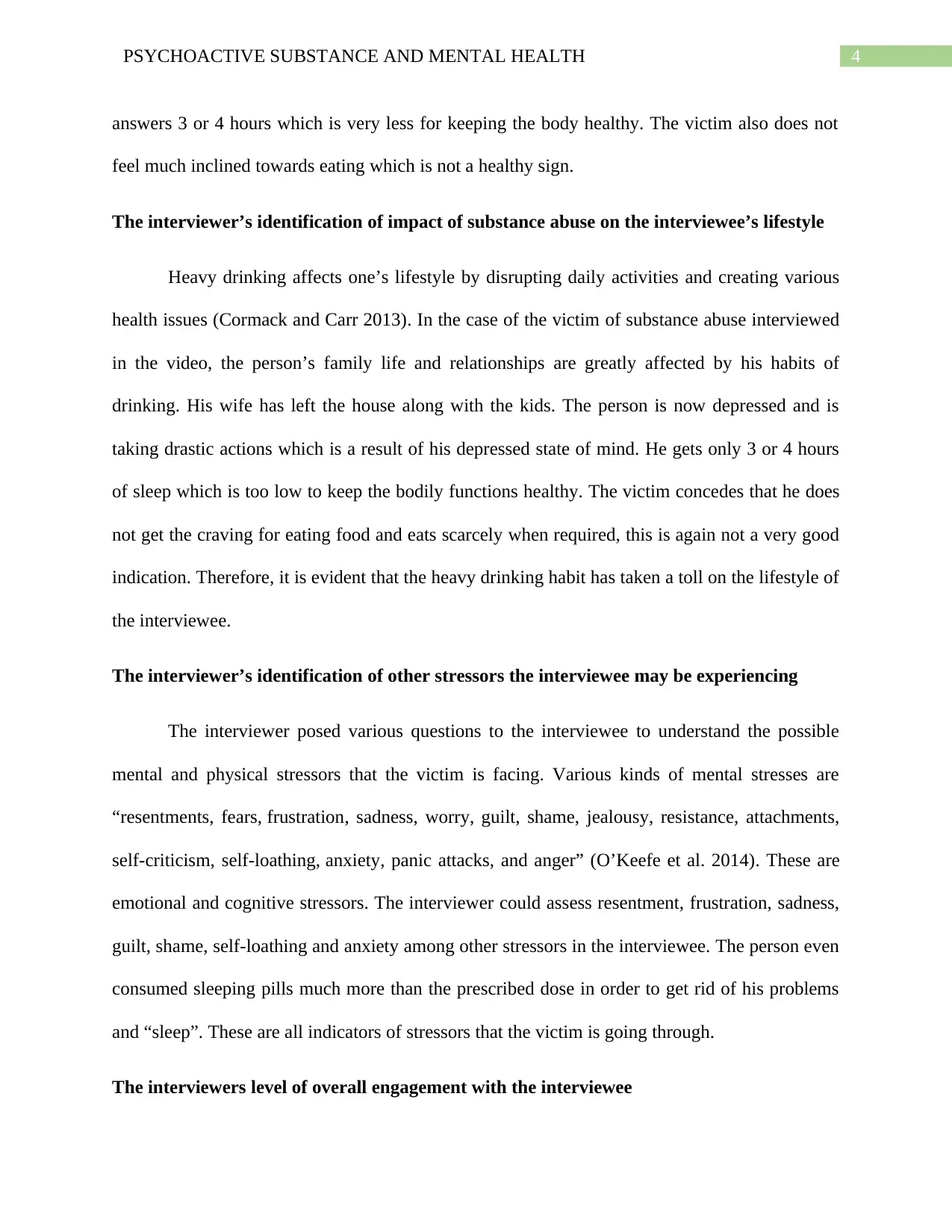
4PSYCHOACTIVE SUBSTANCE AND MENTAL HEALTH
answers 3 or 4 hours which is very less for keeping the body healthy. The victim also does not
feel much inclined towards eating which is not a healthy sign.
The interviewer’s identification of impact of substance abuse on the interviewee’s lifestyle
Heavy drinking affects one’s lifestyle by disrupting daily activities and creating various
health issues (Cormack and Carr 2013). In the case of the victim of substance abuse interviewed
in the video, the person’s family life and relationships are greatly affected by his habits of
drinking. His wife has left the house along with the kids. The person is now depressed and is
taking drastic actions which is a result of his depressed state of mind. He gets only 3 or 4 hours
of sleep which is too low to keep the bodily functions healthy. The victim concedes that he does
not get the craving for eating food and eats scarcely when required, this is again not a very good
indication. Therefore, it is evident that the heavy drinking habit has taken a toll on the lifestyle of
the interviewee.
The interviewer’s identification of other stressors the interviewee may be experiencing
The interviewer posed various questions to the interviewee to understand the possible
mental and physical stressors that the victim is facing. Various kinds of mental stresses are
“resentments, fears, frustration, sadness, worry, guilt, shame, jealousy, resistance, attachments,
self-criticism, self-loathing, anxiety, panic attacks, and anger” (O’Keefe et al. 2014). These are
emotional and cognitive stressors. The interviewer could assess resentment, frustration, sadness,
guilt, shame, self-loathing and anxiety among other stressors in the interviewee. The person even
consumed sleeping pills much more than the prescribed dose in order to get rid of his problems
and “sleep”. These are all indicators of stressors that the victim is going through.
The interviewers level of overall engagement with the interviewee
answers 3 or 4 hours which is very less for keeping the body healthy. The victim also does not
feel much inclined towards eating which is not a healthy sign.
The interviewer’s identification of impact of substance abuse on the interviewee’s lifestyle
Heavy drinking affects one’s lifestyle by disrupting daily activities and creating various
health issues (Cormack and Carr 2013). In the case of the victim of substance abuse interviewed
in the video, the person’s family life and relationships are greatly affected by his habits of
drinking. His wife has left the house along with the kids. The person is now depressed and is
taking drastic actions which is a result of his depressed state of mind. He gets only 3 or 4 hours
of sleep which is too low to keep the bodily functions healthy. The victim concedes that he does
not get the craving for eating food and eats scarcely when required, this is again not a very good
indication. Therefore, it is evident that the heavy drinking habit has taken a toll on the lifestyle of
the interviewee.
The interviewer’s identification of other stressors the interviewee may be experiencing
The interviewer posed various questions to the interviewee to understand the possible
mental and physical stressors that the victim is facing. Various kinds of mental stresses are
“resentments, fears, frustration, sadness, worry, guilt, shame, jealousy, resistance, attachments,
self-criticism, self-loathing, anxiety, panic attacks, and anger” (O’Keefe et al. 2014). These are
emotional and cognitive stressors. The interviewer could assess resentment, frustration, sadness,
guilt, shame, self-loathing and anxiety among other stressors in the interviewee. The person even
consumed sleeping pills much more than the prescribed dose in order to get rid of his problems
and “sleep”. These are all indicators of stressors that the victim is going through.
The interviewers level of overall engagement with the interviewee
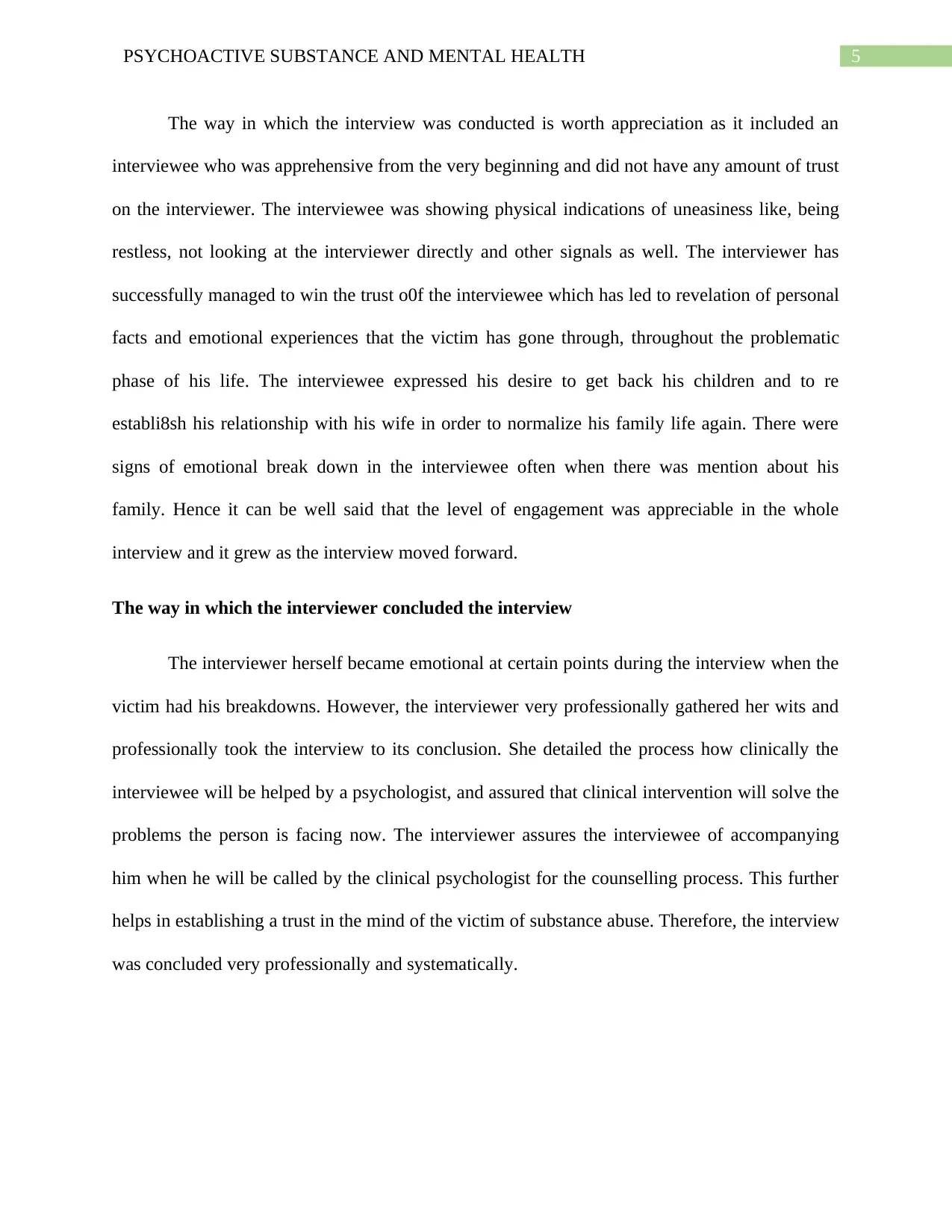
5PSYCHOACTIVE SUBSTANCE AND MENTAL HEALTH
The way in which the interview was conducted is worth appreciation as it included an
interviewee who was apprehensive from the very beginning and did not have any amount of trust
on the interviewer. The interviewee was showing physical indications of uneasiness like, being
restless, not looking at the interviewer directly and other signals as well. The interviewer has
successfully managed to win the trust o0f the interviewee which has led to revelation of personal
facts and emotional experiences that the victim has gone through, throughout the problematic
phase of his life. The interviewee expressed his desire to get back his children and to re
establi8sh his relationship with his wife in order to normalize his family life again. There were
signs of emotional break down in the interviewee often when there was mention about his
family. Hence it can be well said that the level of engagement was appreciable in the whole
interview and it grew as the interview moved forward.
The way in which the interviewer concluded the interview
The interviewer herself became emotional at certain points during the interview when the
victim had his breakdowns. However, the interviewer very professionally gathered her wits and
professionally took the interview to its conclusion. She detailed the process how clinically the
interviewee will be helped by a psychologist, and assured that clinical intervention will solve the
problems the person is facing now. The interviewer assures the interviewee of accompanying
him when he will be called by the clinical psychologist for the counselling process. This further
helps in establishing a trust in the mind of the victim of substance abuse. Therefore, the interview
was concluded very professionally and systematically.
The way in which the interview was conducted is worth appreciation as it included an
interviewee who was apprehensive from the very beginning and did not have any amount of trust
on the interviewer. The interviewee was showing physical indications of uneasiness like, being
restless, not looking at the interviewer directly and other signals as well. The interviewer has
successfully managed to win the trust o0f the interviewee which has led to revelation of personal
facts and emotional experiences that the victim has gone through, throughout the problematic
phase of his life. The interviewee expressed his desire to get back his children and to re
establi8sh his relationship with his wife in order to normalize his family life again. There were
signs of emotional break down in the interviewee often when there was mention about his
family. Hence it can be well said that the level of engagement was appreciable in the whole
interview and it grew as the interview moved forward.
The way in which the interviewer concluded the interview
The interviewer herself became emotional at certain points during the interview when the
victim had his breakdowns. However, the interviewer very professionally gathered her wits and
professionally took the interview to its conclusion. She detailed the process how clinically the
interviewee will be helped by a psychologist, and assured that clinical intervention will solve the
problems the person is facing now. The interviewer assures the interviewee of accompanying
him when he will be called by the clinical psychologist for the counselling process. This further
helps in establishing a trust in the mind of the victim of substance abuse. Therefore, the interview
was concluded very professionally and systematically.
⊘ This is a preview!⊘
Do you want full access?
Subscribe today to unlock all pages.

Trusted by 1+ million students worldwide
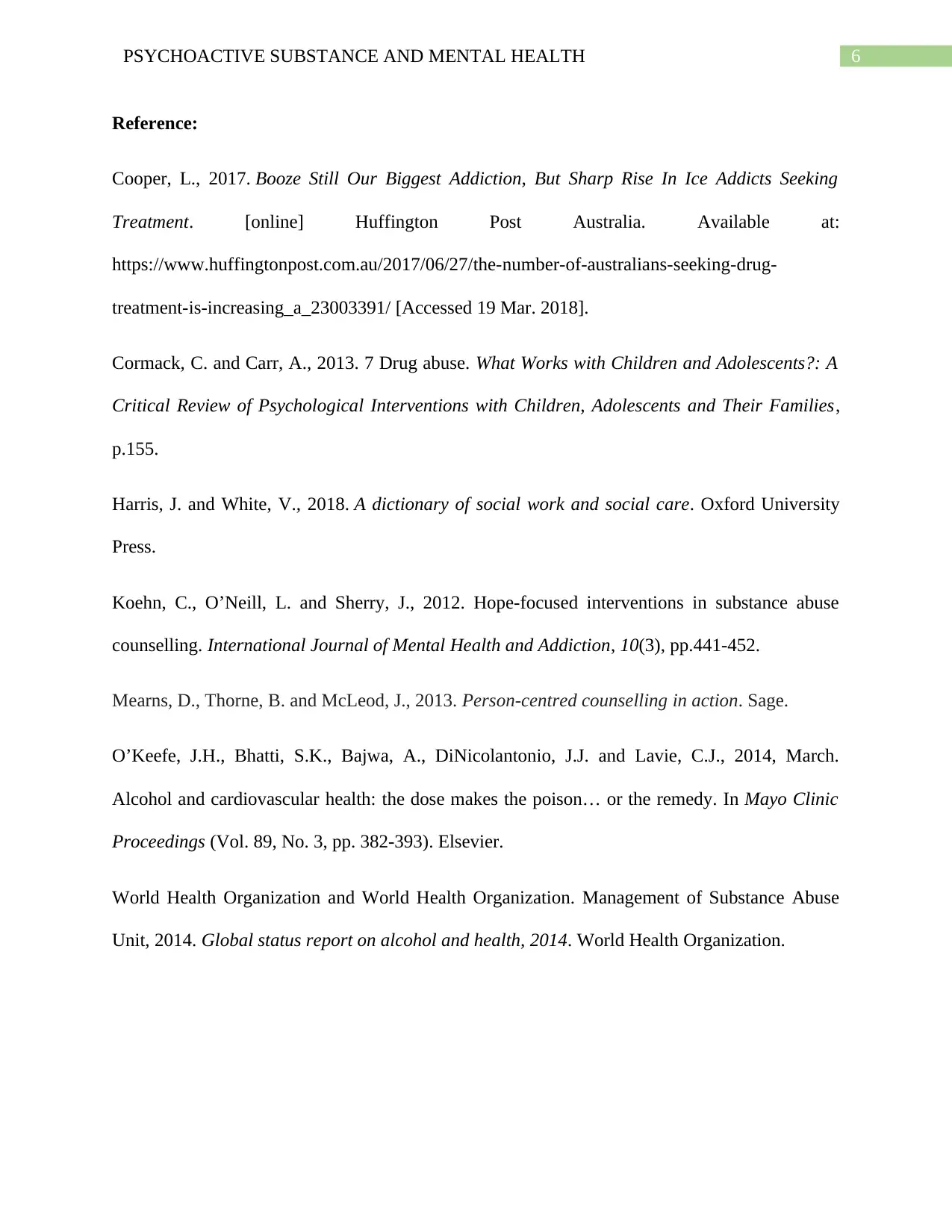
6PSYCHOACTIVE SUBSTANCE AND MENTAL HEALTH
Reference:
Cooper, L., 2017. Booze Still Our Biggest Addiction, But Sharp Rise In Ice Addicts Seeking
Treatment. [online] Huffington Post Australia. Available at:
https://www.huffingtonpost.com.au/2017/06/27/the-number-of-australians-seeking-drug-
treatment-is-increasing_a_23003391/ [Accessed 19 Mar. 2018].
Cormack, C. and Carr, A., 2013. 7 Drug abuse. What Works with Children and Adolescents?: A
Critical Review of Psychological Interventions with Children, Adolescents and Their Families,
p.155.
Harris, J. and White, V., 2018. A dictionary of social work and social care. Oxford University
Press.
Koehn, C., O’Neill, L. and Sherry, J., 2012. Hope-focused interventions in substance abuse
counselling. International Journal of Mental Health and Addiction, 10(3), pp.441-452.
Mearns, D., Thorne, B. and McLeod, J., 2013. Person-centred counselling in action. Sage.
O’Keefe, J.H., Bhatti, S.K., Bajwa, A., DiNicolantonio, J.J. and Lavie, C.J., 2014, March.
Alcohol and cardiovascular health: the dose makes the poison… or the remedy. In Mayo Clinic
Proceedings (Vol. 89, No. 3, pp. 382-393). Elsevier.
World Health Organization and World Health Organization. Management of Substance Abuse
Unit, 2014. Global status report on alcohol and health, 2014. World Health Organization.
Reference:
Cooper, L., 2017. Booze Still Our Biggest Addiction, But Sharp Rise In Ice Addicts Seeking
Treatment. [online] Huffington Post Australia. Available at:
https://www.huffingtonpost.com.au/2017/06/27/the-number-of-australians-seeking-drug-
treatment-is-increasing_a_23003391/ [Accessed 19 Mar. 2018].
Cormack, C. and Carr, A., 2013. 7 Drug abuse. What Works with Children and Adolescents?: A
Critical Review of Psychological Interventions with Children, Adolescents and Their Families,
p.155.
Harris, J. and White, V., 2018. A dictionary of social work and social care. Oxford University
Press.
Koehn, C., O’Neill, L. and Sherry, J., 2012. Hope-focused interventions in substance abuse
counselling. International Journal of Mental Health and Addiction, 10(3), pp.441-452.
Mearns, D., Thorne, B. and McLeod, J., 2013. Person-centred counselling in action. Sage.
O’Keefe, J.H., Bhatti, S.K., Bajwa, A., DiNicolantonio, J.J. and Lavie, C.J., 2014, March.
Alcohol and cardiovascular health: the dose makes the poison… or the remedy. In Mayo Clinic
Proceedings (Vol. 89, No. 3, pp. 382-393). Elsevier.
World Health Organization and World Health Organization. Management of Substance Abuse
Unit, 2014. Global status report on alcohol and health, 2014. World Health Organization.
1 out of 7
Related Documents
Your All-in-One AI-Powered Toolkit for Academic Success.
+13062052269
info@desklib.com
Available 24*7 on WhatsApp / Email
![[object Object]](/_next/static/media/star-bottom.7253800d.svg)
Unlock your academic potential
Copyright © 2020–2026 A2Z Services. All Rights Reserved. Developed and managed by ZUCOL.





